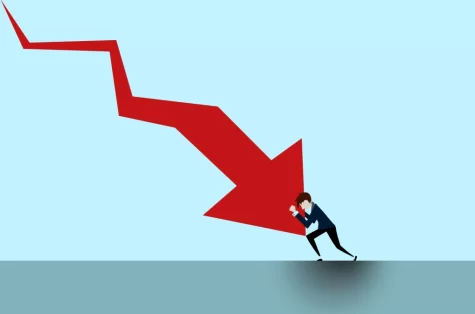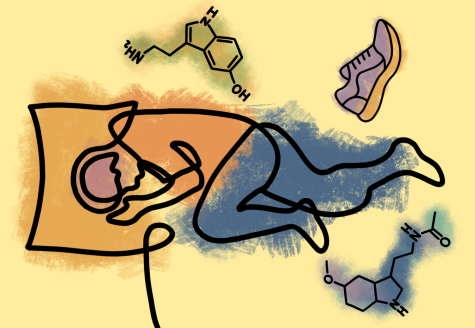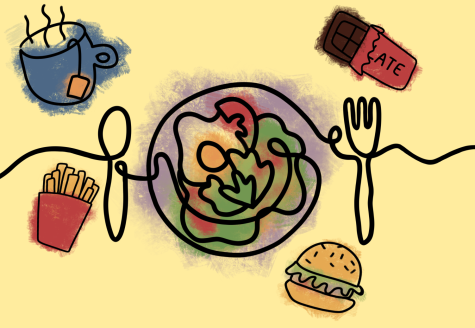Hyper-individualism is an American myth

Graphic courtesy of Clipartx
There is a common saying: “pull yourself up by your bootstraps,” referring to succeeding without any outside help. The phrase was originally meant to be ironic because it is physically impossible to pull oneself up by their own bootstraps. However, it has become synonymous with working hard to achieve one’s goals. This mentality is widely promoted through U.S. media People should be concerned for their own well-being and success, but people and the media often exaggerate the importance of looking out for number one.
One common example of this is in school. High school students are often under a lot of pressure to stand out from their peers by getting good grades, joining clubs, volunteering and doing other extracurricular activities. Furthermore, they are encouraged to be the best in these activities. Instead of getting good grades, one must be valedictorian. Instead of joining a club, one must be president of a club.
Striving to outperform one’s peers can cause excessive stress for high school students. The pressure to perform fosters an environment of competition, rather than one of learning. An article by the University of Dundee found “individualism to be associated with a reduced satisfaction with life, along with an increased likelihood of depressive symptomology and suicide ideation in young people.” The study compared a group of U.S. university students to a group of Japanese university students. The study found that there was a negative association between individualism and the general well-being of the individual. In addition, the study found that competition and overt independence can be detrimental to one’s mental health.
Economically, individualism has the same effects that it does socially. The U.S. is a capitalist society, meaning that people are motivated to serve their own interests. As a result, stories are often told of people who take advantage of the system and rise to the top through grit and determination. One such example is Jeff Bezos. People often recount how Amazon started as a small book store in the early days of the internet, and Bezos made smart business decisions to elevate it to where it is today: the biggest online retailer in the world. However, when one thinks of the company, Bezos comes to mind, not the thousands of underpaid Amazon employees. In fact, leaked documents show the turnover rate for Amazon warehouse employees was approximately 150 percent a year, even before the pandemic. Poor working conditions, low pay and feeling replaceable lead to this mass-quitting issue. While Amazon has a strong correlation with its founder, Bezos is not the sole reason for the company’s success, and should not be considered more important than the workers who help the company function. These tales of CEOs who flourished in this individualistic society propagate the idea that individualism is advantageous. Despite these common conceptions about individualism, that is often not the case.
These individuals did rise to the top, but many had significant advantages beforehand that allowed them to go to school and fund their startups. Jeff Bezos, is often seen as a self-made man. He tells stories of how he started Amazon in a garage. While this is true, he received a quarter of a million-dollar investment from his father when he started. Countless billionaires claim that they started from nothing, but time and time again, it is revealed that they received advanatges. On the internet, these figures have been named nepo-babies, short for nepotism babies. A shocking number of celebrities who are assumed to be self-made have been revealed to be so-called nepo-babies, including Elon Musk, Hailey Beiber, and countless others.
This can be a significant advantage in an individualistic society; the opposite effect occurs for those who start with less. People who are born into poverty or are minorities have much less upward mobility than others. Opportunity Atlas shows the effects of growing up in poverty to one’s financial status. They say that a child’s location effects upward financial status later in life; the more time a child spends in a higher-income area, the more likely they are to have a higher income later in life. This shows that although individualism promotes the idea of taking one’s wealth into their own hands, factors such as race, class and gender greatly contribute to their future wealth.
Unions and strikes also demonstrate the necessity of collectivism. Unions and strikes have ensured that countless people are treated fairly by their employers. Non-union members on average earn just 85% of what union workers earn, according to the U.S. Department of Labor. Additionally, union members experience numerous other benefits, such as equal pay, more paid leave and better working and safety conditions.
Workers banding together in a strike can have a similar effect. A new trend among Generation-Z workers who are unsatisfied with their working conditions is quiet quitting. They continue to work, but they only do the tasks required for their role, instead of going above and beyond. This behavior spreads quickly throughout the workplace. Quiet quitting shows that coming together as a group invokes change that would not be possible for one individual, as a group’s combined voice resonates more loudly than one individual’s.
Each individual is part of a complex system and that no one alone can be self-made, as several factors influence one’s socioeconomic mobility and overall quality of life. Therefore, it is harmful to perpetuate the idea that one’s success is solely determined by their hardwork and that change can be made by one person.












